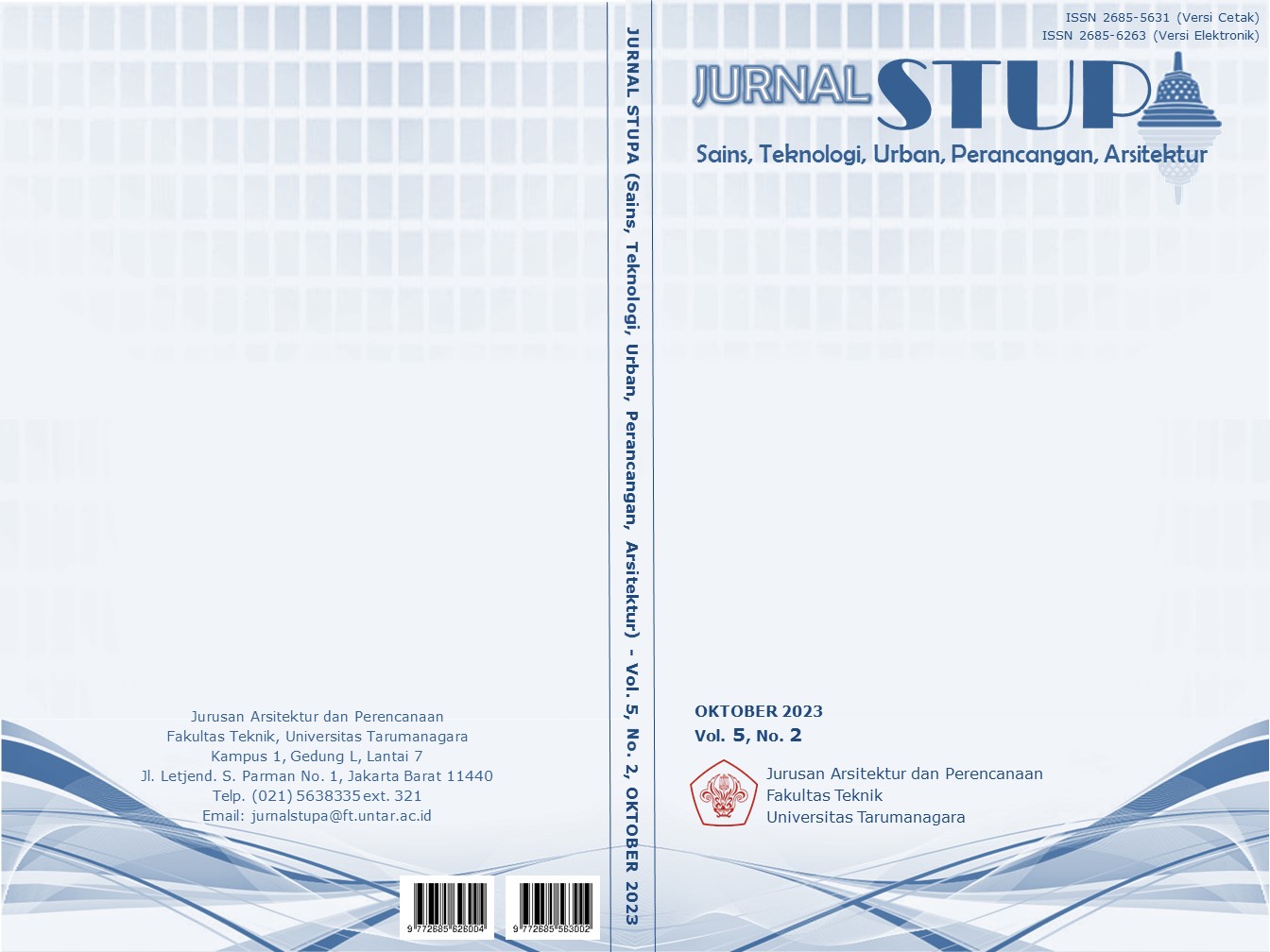PENERAPAN KONSEP TRANSPROGRAMMING SEBAGAI PENDEKATAN PERANCANGAN WADAH OBSERVASI DAN PERAWATAN REMAJA DEPRESI
Main Article Content
Abstract
Depression is one of the leading mental disorders in the world, including among teenagers. According to the National Adolescent Mental Health Survey in 2022, as many as one in three teenagers aged 10-17 years in Indonesia experience a mental disorder, including depression. The causes vary, but depression is generally not detected among teenagers. This is caused by the stigma that depression is synonymous with psychiatric disorders and madness; this phenomenon is supported indirectly by the architectural conditions of psychology clinics that are generally too sterile and intimidating like hospitals. As a result, parents do not take depression seriously and teenagers who suffer from it do not receive proper observation or treatment. This drives depressed teenagers to turn to alcohol, drugs, self-harm, or even suicide despite being in the prime age to form social skills, choose majors, and develop personal potential for their future. Therefore, teenagers who suffer from depression are vulnerable users who must be given empathy so they may receive proper observation, treatment, and rehabilitation. Architecture is capable of playing a role in the empathic process by using empathic architecture as an approach. Utilizing transprogramming as an approach to architectural design and interviews as qualitative methods, the collection of data aims to position teenagers with depression as users in architectural space. The end result is a space where teenagers with depression would be able to receive observation and treatment without feeling intimidated.
Keywords: Empathic Architecture; Observation; Teen Depression; Transprogramming; Treatment
Abstrak
Depresi merupakan salah satu gangguan mental terkemuka di dunia, termasuk di tengah kalangan remaja. Menurut National Adolescent Mental Health Survey di tahun 2022, sebanyak satu dari tiga remaja berusia 10 - 17 tahun di Indonesia memiliki gangguan mental, termasuk depresi. Penyebabnya beragam, namun depresi umumnya tidak terdeteksi pada usia remaja. Hal ini merupakan dampak dari stigma bahwa depresi identik dengan gangguan kejiwaan dan kegilaan; fenomena ini didukung secara tidak langsung oleh kondisi arsitektur klinik psikologi yang umumnya bersifat terlalu steril dan mengintimidasi seperti rumah sakit. Akibatnya, orang tua tidak menanggapi depresi dengan serius dan remaja yang menderita tidak mendapat observasi atau perawatan yang selayaknya diberikan. Hal ini mendorong remaja depresi untuk beralih ke alkohol, obat-obatan, menyakiti diri sendiri, atau bahkan bunuh diri meski sedang berada di usia prima untuk membentuk keterampilan sosial, memilih jurusan, dan mengembangkan potensi pribadi untuk masa depan masing-masing. Oleh karena itu, remaja yang mengalami depresi diposisikan sebagai vulnerable user yang harus diberikan empati agar mendapat observasi, perawatan, dan rehabilitasi yang selayaknya diterima. Arsitektur mampu berperan dalam proses empati tersebut dengan menggunakan pendekatan arsitektur empati. Dengan metode transprogramming dalam rancangan arsitektur serta metode kualitatif berupa wawancara, data yang diambil bertujuan untuk memposisikan remaja depresi sebagai user dalam ruang arsitektur. Hasil akhir berupa perencanaan sebuah wadah dimana remaja depresi dapat menerima observasi dan perawatan tanpa merasa terintimidasi.
Article Details
Section

This work is licensed under a Creative Commons Attribution-NonCommercial-ShareAlike 4.0 International License.
This work is licensed under a Jurnal Sains, Teknologi, Urban, Perancangan, Arsitektur/ STUPA Creative Commons Attribution-NonCommercial-ShareAlike 4.0 International LicenseReferences
Berman, M. G., Kross, E., Krpan, K. M., Askren, M. K., Burson, A., Deldin, P. J., Kaplan, S., Sherdell, L., Gotlib, I. H., & Jonides, J. (2012). Interacting with nature improves cognition and affect for individuals with depression. Journal of Affective Disorders, 140(3), 300-305.
Gill, N. (2019). The Importance Of Trauma-Informed Design. Retrieved April 18, 2023, from Forbes, <https://www.forbes.com/sites/forbesnonprofitcouncil/2019/12/09/the-importance-of-trauma-informed-design/?sh=72b52a516785>
Giorgi, E., Cattaneo, T., & Guerrero, K. P. S. (2022). The Principles of Design for Vulnerable Communities: A Research by Design Approach Overrunning the Disciplinary Boundaries. Strategies for Sustainable Urban Development, 12(11). doi.org/10.3390/buildings12111789
Hartini, N., Fardana, N. A., Ariana, A. D., & Wardana, N. D. (2022). Stigma toward people with mental health problems in Indonesia. Psychology Research and Behavior Management, 11(1), 535-541.
Kenny, K. (2021). Recognize Mental Illness Through Observation and Screening. Pharmacy Times Retrieved April 18, 2023, from <https://www.pharmacytimes.com/view/recognize-mental-illness-through-observation-and-screening>
Lehtinen, H. (2020). Designing with and for empathy — Architecture that empowers. Retrieved April 18, 2023, from <https://medium.com/ravenandwood/designing-with-and-for-empathy-3dcb04d1141c>
Mediastika, C. E. (2016). Understanding empathic architecture. Journal of Architecture and Urbanism, 40(1), 1-1.
Mental Health America. (2023). Depression in Teens. Diunduh April 18, 2023, https://mhanational.org/depression-teens-0
PUSLITDATIN. (2019). Penggunaan Narkotika di Kalangan Remaja Meningkat. Retrieved April 18, 2023, from BNN <https://bnn.go.id/penggunaan-narkotika-kalangan-remaja-meningkat/>
Sardjito. (2022). Minimnya Kesadaran Masyarakat terhadap Mental Health. Retrieved April 18, 2023, from RSUP Dr Sardjito, <https://sardjito.co.id/2022/03/09/minimnya-kesadaran-masyarakat-terhadap-mental-health/>
Sandman, H. (2021). Empathy Matters: Architecture for the World's Majority. School of Art and Design.
Tschumi, B. (1996). Architecture and Disjunction. MIT Press.
WHO. (2021). Suicide Worldwide in 2019: Global Health Estimates. World Health Organization.
WHO. (2023). Depressive disorder (depression). Retrieved April 18, 2023, from https://www.who.int/news-room/fact-sheets/detail/depression

